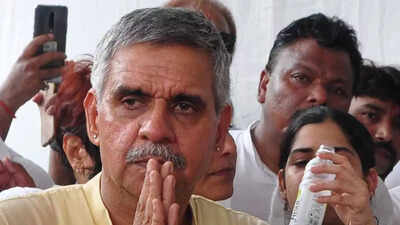Top Searches
- News
- India News
- Betrayal, cries Dikshit as G23’s senior-most quits Congress
Betrayal, cries Dikshit as G23’s senior-most quits Congress

NEW DELHI: Minutes after the leading light of dissident group G23 Ghulam Nabi Azad resigned from Congress, a member of the bloc, Sandeep Dikshit, accused him of betrayal, telling Azad that he signed the letter seeking reforms in the party out of the conviction that it will lead to internal churn to revitalise the party. “We had raised a banner of reform, not revolt,” Dikshit noted with dismay in a letter to Azad.
Dikshit’s terse remark summed up the ginger group that Azad along with 22 other Congressmen brought into being in August 2020 with a letter to Sonia Gandhi, expressing concern over the dwindling fortunes of the party and demanding thorough reforms. Azad, as the seniormost member who had served with three generations of the Gandhis, became the chairman of sorts of what came to be known as G23.
With Azad severing his over half century-old link with Congress, it is virtually the end of the bloc. Vivek Tankha and Mukul Wasnik have found favour and been renominated to Rajya Sabha. Others like Jitin Prasada (minister in BJP’s UP government) and Kapil Sibal (RS member with SP’s backing) have quit the party.
But dissident leader Anand Sharma began sabre-rattling last week by resigning as the chairman of an election panel of Himachal Pradesh Congress. He has since started touring the poll-bound hill state, raising suspicion about his course of action, with many wondering if he could jolt the party closer to polls, when it would hurt Congress the most. Lok Sabha MP Manish Tewari has been making comments in public, and has clashed with AICC with his policy choices.
Dikshit said he knew he would be blacklisted in the party for joining G23, and underlined that “the party lies in its darkest abyss today”, claiming it was his sincerity to the cause that made him join the dissidents. It means the agenda and many members of the group have not found favour with the Congress leadership even after the passage of two years.
Dikshit’s terse remark summed up the ginger group that Azad along with 22 other Congressmen brought into being in August 2020 with a letter to Sonia Gandhi, expressing concern over the dwindling fortunes of the party and demanding thorough reforms. Azad, as the seniormost member who had served with three generations of the Gandhis, became the chairman of sorts of what came to be known as G23.
With Azad severing his over half century-old link with Congress, it is virtually the end of the bloc. Vivek Tankha and Mukul Wasnik have found favour and been renominated to Rajya Sabha. Others like Jitin Prasada (minister in BJP’s UP government) and Kapil Sibal (RS member with SP’s backing) have quit the party.
But dissident leader Anand Sharma began sabre-rattling last week by resigning as the chairman of an election panel of Himachal Pradesh Congress. He has since started touring the poll-bound hill state, raising suspicion about his course of action, with many wondering if he could jolt the party closer to polls, when it would hurt Congress the most. Lok Sabha MP Manish Tewari has been making comments in public, and has clashed with AICC with his policy choices.
Dikshit said he knew he would be blacklisted in the party for joining G23, and underlined that “the party lies in its darkest abyss today”, claiming it was his sincerity to the cause that made him join the dissidents. It means the agenda and many members of the group have not found favour with the Congress leadership even after the passage of two years.
FOLLOW US ON SOCIAL MEDIA
FacebookTwitterInstagramKOO APPYOUTUBE
Start a Conversation
end of article










